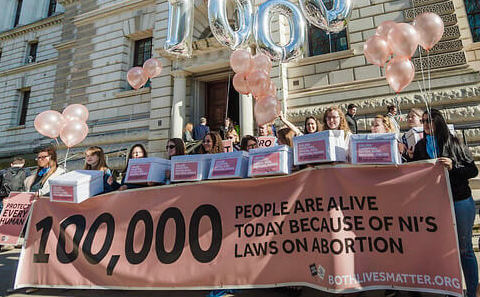Women and Equalities Committee divided on NI abortion inquiry reports
25 April 2019 – The Women and Equalities Committee has today released two separate reports following their Inquiry into abortion law in Northern Ireland.
Four members of the Committee voted in support of the Chair’s report and two members voted in support of the alternative ‘Hughes report’.
The Chair’s report did not come out in support of introducing abortion on demand to Northern Ireland from Westminster, as is currently being sought by abortion campaigners. The report instead made a recommendation that Westminster should change the law in Northern Ireland to allow for abortion when an unborn child has a ‘life limiting disability’.
This recommendation is out of line with an estimated 88.7% of the submissions to the Inquiry which did not want Westminster to change the law on abortion in Northern Ireland.
The alternative ‘Hughes’ report made a number of recommendations which were in line with the vast majority of submissions that did not want Westminster to change the law on abortion in Northern Ireland.
The alternative report published on pages 58-70 of the published output from the Inquiry made a number of key points and recommendations including the following:
- The UK Government should not undermine the devolution settlement: (para. 17) “Our Committee cannot recommend any change to the law on abortion in Northern Ireland as it would undermine the devolution settlement, nor is it mandated that the UK Government act on the basis of international obligations.”
- There is no legal imperative for the UK Government to change abortion law in Northern Ireland: (18) “Aside from the fact that observation of human rights matters is a devolved competency, there is currently no legal imperative for the Northern Ireland Assembly to change the law on abortion arising from current jurisprudence.”
- The Supreme Court has not made a declaration of incompatibility: (19) “…there was no declaration of incompatibility made by the Supreme Court in the Northern Ireland Human Rights Committee (NIHRC) case in June 2018.”
- Recommendations made by the unelected UN CEDAW Committee do not have the backing of international law, are only advisory and not binding: (34) “Our Committee therefore notes that the views expressed by the CEDAW Committee is advisory—and in this case without the backing of international law that they are supposed to work within—so to suggest that the Government establish a framework to address the recommendations of the CEDAW report places a disproportionate and misguided degree of authority on its substantive findings and the limited jurisdiction of this unelected UN Committee.”
- There should be improved support for women with a child with a life-limiting disability: (para 48-50) “The Department should review whether improvements to the maternal health strategy and the implementation of the Regional Centre can be implemented as soon as possible to improve the overall care for women with a diagnosis of a fatal foetal abnormality.”
Polling undertaken by ComRes in October 2018 revealed that 64% of the population in Northern Ireland think that changing the law on this issue should be a decision for the people of Northern Ireland and their elected representatives. The polling also showed a strong majority of women reject interference from Westminster on this sensitive issue with 66% agreeing that this was a decision for Northern Ireland. The strongest support among age groups surveyed came from the youngest age group, 18-34 year olds, with 70% agreeing that they did not want abortion law imposed on Northern Ireland from Westminster.
A spokesperson for Right To Life UK, Clare McCarthy said:
“The vast majority of submissions to the Inquiry did not want to see Westminster change the law on abortion in Northern Ireland. The four English MPs that voted for the Chair’s report appear to have totally ignored these submissions which are consistent with recent polling on this issue.
The alternative ‘Hughes Report’ makes it clear that devolution must be respected and that any changes in Northern Ireland’s abortion laws should be made in Northern Ireland, not imposed by MPs in Westminster. The report also made some very helpful recommendations for improving support for families with children with life-limiting disabilities.
Abortion in Northern Ireland remains a devolved issue and the Government in Westminster must be reminded that they have no mandate from the people of Northern Ireland to make any changes to their pro-life laws on abortion.”
ENDS
- For additional quotes and media interviews contact 07847 454108
- The alternative ‘Hughes Report’ is available on pages 58 – 70 of the embargoed report document that is available from the Women and Equalities Committee.
- As of 1.00pm on April 24 the Committee had published 653 written submission on its website. Following analysis of each response, it was found that an estimated 88.7% of responses received by the Committee did not want Westminster to change the law on abortion in Northern Ireland. 9.9% of responses called for legislative change with regard to abortion while 1.4% did not take a stance either way. This figure accepted the grouping of a petition signed by over 2000 individuals as one submission and a collation of over 130 responses from Alliance for Choice as one submission.
- ComRes interviewed 1,013 Northern Irish adults online between 8th and 15th October 2018. Data was weighted to be representative of all Northern Irish adults. ComRes is a member of the British Polling Council and abides by its rules. Full data tables are available here: https://www.comresglobal.com/wp-content/uploads/2018/10/2018-Both-Lives-Matter.pdf


